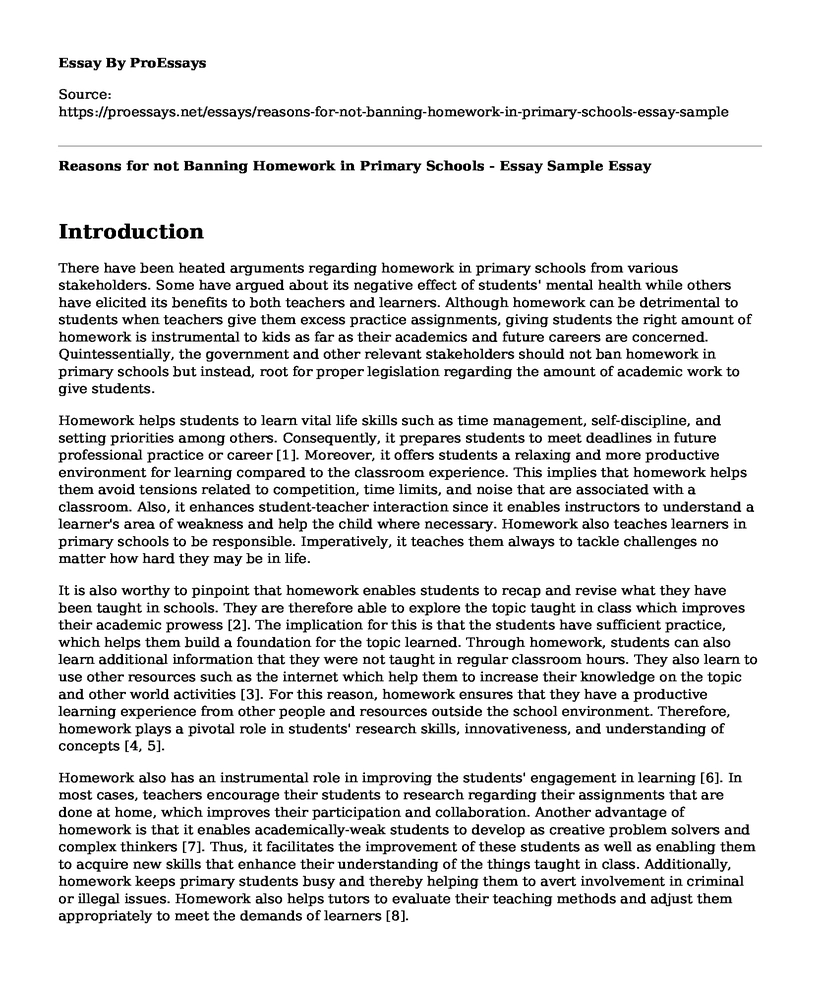Introduction
There have been heated arguments regarding homework in primary schools from various stakeholders. Some have argued about its negative effect of students' mental health while others have elicited its benefits to both teachers and learners. Although homework can be detrimental to students when teachers give them excess practice assignments, giving students the right amount of homework is instrumental to kids as far as their academics and future careers are concerned. Quintessentially, the government and other relevant stakeholders should not ban homework in primary schools but instead, root for proper legislation regarding the amount of academic work to give students.
Homework helps students to learn vital life skills such as time management, self-discipline, and setting priorities among others. Consequently, it prepares students to meet deadlines in future professional practice or career [1]. Moreover, it offers students a relaxing and more productive environment for learning compared to the classroom experience. This implies that homework helps them avoid tensions related to competition, time limits, and noise that are associated with a classroom. Also, it enhances student-teacher interaction since it enables instructors to understand a learner's area of weakness and help the child where necessary. Homework also teaches learners in primary schools to be responsible. Imperatively, it teaches them always to tackle challenges no matter how hard they may be in life.
It is also worthy to pinpoint that homework enables students to recap and revise what they have been taught in schools. They are therefore able to explore the topic taught in class which improves their academic prowess [2]. The implication for this is that the students have sufficient practice, which helps them build a foundation for the topic learned. Through homework, students can also learn additional information that they were not taught in regular classroom hours. They also learn to use other resources such as the internet which help them to increase their knowledge on the topic and other world activities [3]. For this reason, homework ensures that they have a productive learning experience from other people and resources outside the school environment. Therefore, homework plays a pivotal role in students' research skills, innovativeness, and understanding of concepts [4, 5].
Homework also has an instrumental role in improving the students' engagement in learning [6]. In most cases, teachers encourage their students to research regarding their assignments that are done at home, which improves their participation and collaboration. Another advantage of homework is that it enables academically-weak students to develop as creative problem solvers and complex thinkers [7]. Thus, it facilitates the improvement of these students as well as enabling them to acquire new skills that enhance their understanding of the things taught in class. Additionally, homework keeps primary students busy and thereby helping them to avert involvement in criminal or illegal issues. Homework also helps tutors to evaluate their teaching methods and adjust them appropriately to meet the demands of learners [8].
Conclusion
In conclusion, homework is a very crucial component of learning is it enables students to acquire several benefits. Imperatively, it serves the twosome role of improving the academic performance of students as well as preparing them for future responsibility and career. Moreover, it helps teachers to customize their teaching methods to specific students based on the weaknesses identified. In this regard, the government and other responsible stakeholders should not ban homework in primary schools. However, teachers should not give students too much homework to avoid causing mentally-related problems to them.
References
1. Baran A. Home Improvement: look at the historical role of homework in education, where we are today, and what schools need to consider as they evaluate their approach. Independent School [Internet]. 2019 Jan [cited 2019 Feb 11];78(2):44-7.
2. Marzano RJ, Pickering DJ. Special topic: The case for and against homework. Educational leadership. 2007 Mar;64(6):74-9.
3. Titard PL, DeFranceschi JE, Knight E. Using Online Homework to Improve Exam Scores. Journal of Business & Educational Leadership [Internet]. 2014 Fall [cited 2019 Feb 11];5(1):58-63.
4. Tas Y, Sungur-Vural S, Oztekin C. A study of science teachers' homework practices. Research in Education [Internet]. 2014 May [cited 2019 Feb 11];91(1):45-64.
5. Jianzhong Xu, Ruiping Yuan, Brian Xu, Melinda Xu. Modeling students' interest in mathematics homework. Journal of Educational Research [Internet]. 2016 Mar [cited 2019 Feb 11];109(2):148-58.
6. Simkin M, Stiver D. Self-graded homework: Some empirical tests of efficacy. Journal of Education for Business [Internet]. 2016 Jan [cited 2019 Feb 11];91(1):52-8.
7. Bennett CA. "Most Won't Do It!" Examining Homework as a Structure for Learning in a Diverse Middle School. American Secondary Education [Internet]. 2017 Spring [cited 2019 Feb 11];45(2):22-38.
8. Kalenkoski CM, Pabilonia SW. Does high school homework increase academic achievement? Education Economics [Internet]. 2017 Feb [cited 2019 Feb 11];25(1):45-59.
Cite this page
Reasons for not Banning Homework in Primary Schools - Essay Sample. (2022, Nov 25). Retrieved from https://proessays.net/essays/reasons-for-not-banning-homework-in-primary-schools-essay-sample
If you are the original author of this essay and no longer wish to have it published on the ProEssays website, please click below to request its removal:
- Applying For Scholarship
- Young People are Free From Responsibilities Essay
- How Historians Have Interpreted the Speech Essay
- Essay Example on Inclusive Education: Philosophy of Exceptional Learning
- Essay Example on Being an Instructor: Challenges & Rewards
- Essay on Inclusive Education: Achieving Social & Academic Success for Children With Disabilities
- Essay Example on Careful Planning: The Key to Excellent Teaching







